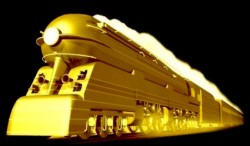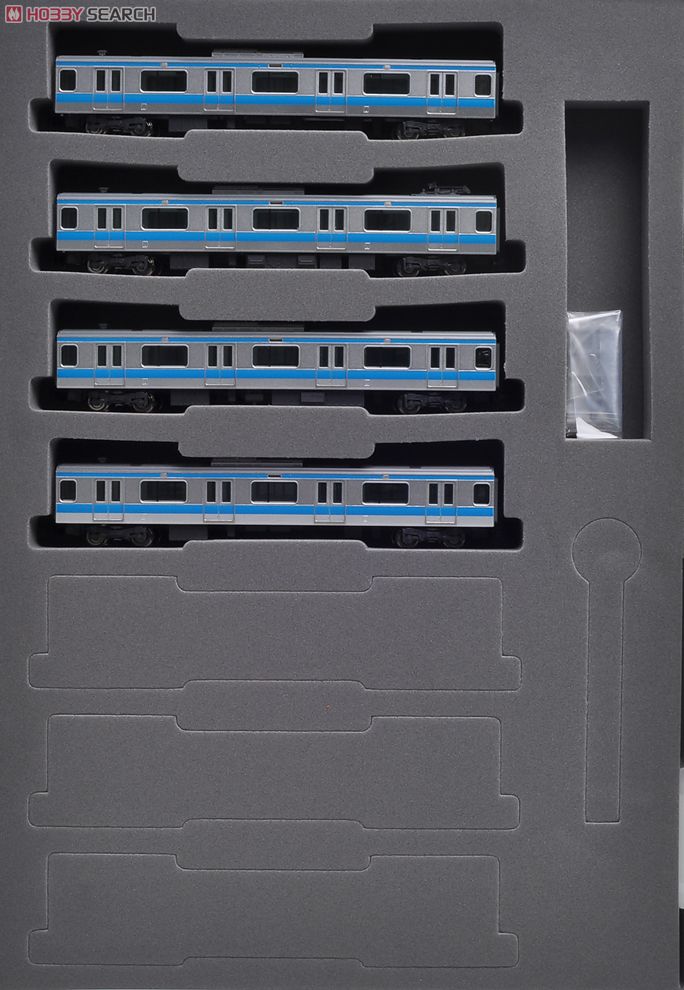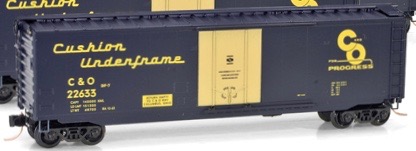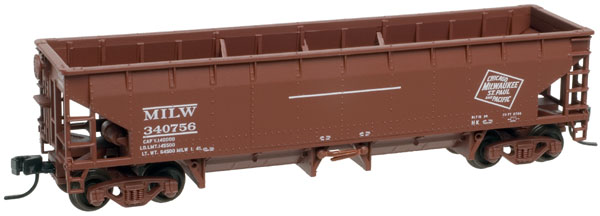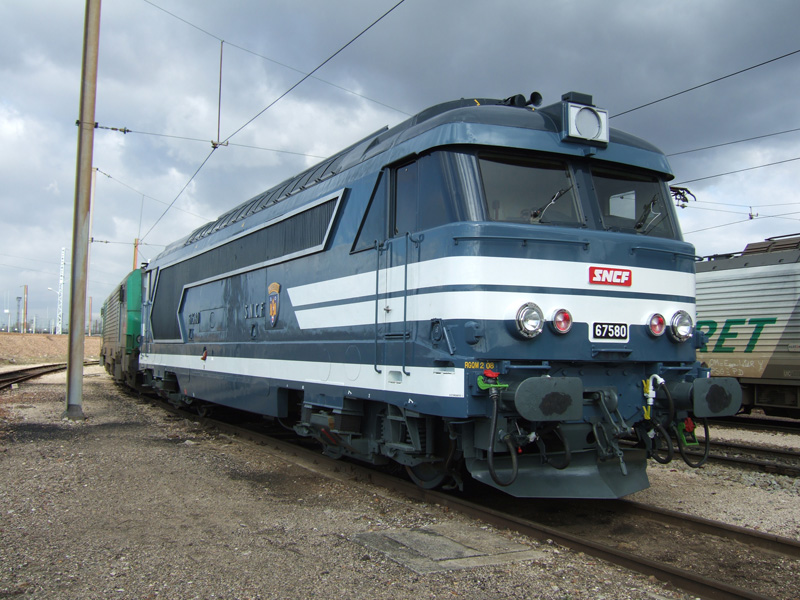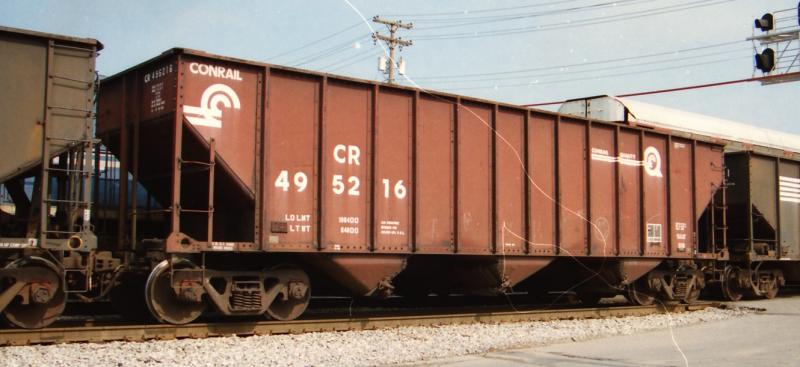Model Information: Developed by Norfolk and Western back in the 1960s, the 100-ton rib-side 3-bay hopper quickly became a favorite of many coal railroads. As locomotives grew ever larger, and when used in tandems, huge amounts of coal could be delivered by long consists of these hoppers to mills and power plants across the country. Our first issue was used to haul coal for the Pennsylvania Power and Light Company; the PP&L had these hoppers made from rust-proof metal, which they would not paint. Instead, a dark brown skin formed on the surface which required very little maintenance; only the lettering needed occasional touch-up or repainting. By special agreement with PENNZEE, Full Throttle is immensely proud and excited to offer this important and historic hopper for use in Z Scale.
Prototype History: The 1960s brought about a growth in car size (and capacity). Railroads that transported coal moved away from the older 2-bay 55-ton USRA standard to newer 90- and 100-ton three bay hoppers. On the WM, the first 90 ton cars were purchased for stone service to Sparrows Point around 1963. These cars were effective and long-lived. Many railroads swapped out the trucks on these cars to increase the capacity to 100 tons. Many companies produced these, including Pullman, Bethlehem, Evans, Greenville, Trinity and Ortner. Details, of course, vary from manufacturer to manufacturer, but typically they were rib-sided. As of 2007, the NS still had lots of 90 ton hoppers in coal service.
Road Name History: The Louisville and Nashville Railroad (reporting mark LN), commonly called the L&N, was a Class I railroad that operated freight and passenger services in the southeast United States.
Chartered by the Commonwealth of Kentucky in 1850, the road grew into one of the great success stories of American business. Operating under one name continuously for 132 years, it survived civil war and economic depression and several waves of social and technological change. Under Milton H. Smith, president of the company for thirty years, the L&N grew from a road with less than three hundred miles (480 km) of track to a 6,000-mile (9,700 km) system serving thirteen states. As one of the premier Southern railroads, the L&N extended its reach far beyond its namesake cities, stretching to St. Louis, Memphis, Atlanta, and New Orleans. The railroad was economically strong throughout its lifetime, operating both freight and passenger trains in a manner that earned it the nickname, "The Old Reliable."
Growth of the railroad continued until its purchase and the tumultuous rail consolidations of the 1980s which led to continual successors. By the end of 1970, L&N operated 6,063 miles (9,757 km) of road on 10,051 miles (16,176 km) of track, not including the Carrollton Railroad.
In 1971 the Seaboard Coast Line Railroad, successor to the Atlantic Coast Line Railroad, purchased the remainder of the L&N shares it did not already own, and the company became a subsidiary. By 1982 the railroad industry was consolidating quickly, and the Seaboard Coast Line absorbed the Louisville & Nashville Railroad entirely. Then in 1986, the Seaboard System merged with the C&O and B&O and the new combined system was known as the Chessie System. Soon after the combined company became CSX Transportation (CSX), which now owns and operates all of the former Louisville and Nashville lines.
Read more on Wikipedia.
Chartered by the Commonwealth of Kentucky in 1850, the road grew into one of the great success stories of American business. Operating under one name continuously for 132 years, it survived civil war and economic depression and several waves of social and technological change. Under Milton H. Smith, president of the company for thirty years, the L&N grew from a road with less than three hundred miles (480 km) of track to a 6,000-mile (9,700 km) system serving thirteen states. As one of the premier Southern railroads, the L&N extended its reach far beyond its namesake cities, stretching to St. Louis, Memphis, Atlanta, and New Orleans. The railroad was economically strong throughout its lifetime, operating both freight and passenger trains in a manner that earned it the nickname, "The Old Reliable."
Growth of the railroad continued until its purchase and the tumultuous rail consolidations of the 1980s which led to continual successors. By the end of 1970, L&N operated 6,063 miles (9,757 km) of road on 10,051 miles (16,176 km) of track, not including the Carrollton Railroad.
In 1971 the Seaboard Coast Line Railroad, successor to the Atlantic Coast Line Railroad, purchased the remainder of the L&N shares it did not already own, and the company became a subsidiary. By 1982 the railroad industry was consolidating quickly, and the Seaboard Coast Line absorbed the Louisville & Nashville Railroad entirely. Then in 1986, the Seaboard System merged with the C&O and B&O and the new combined system was known as the Chessie System. Soon after the combined company became CSX Transportation (CSX), which now owns and operates all of the former Louisville and Nashville lines.
Read more on Wikipedia.
Brand/Importer Information: Greetings, I'm Will, a Fine Arts graduate of Kutztown University in Pennsylvania who grew up in the Delaware Valley. I worked for 30 years with the Pennsylvania German Folklife Society. For ten years I had a permanent booth, each month showing my "PA Dutch" wares, at the country's largest under-roof Antique Market in Atlanta, GA. When Mom and Dad started to have health issues, I was forced to give up the nomadic life, but during my travels I came to love Z Scale Model Railroading, as I could easily take small layouts with me to the motels and play with my trains in the evenings!
Now that Mom and Dad are gone, and after many years of providing care for my "Pappy" in Florida, I find myself a homebody in the "Sunshine State" with a neat little business, supplying interested Z hobbyists with rolling stock and unique quality products!
Item created by: CNW400 on 2021-08-24 13:07:28
If you see errors or missing data in this entry, please feel free to log in and edit it. Anyone with a Gmail account can log in instantly.
If you see errors or missing data in this entry, please feel free to log in and edit it. Anyone with a Gmail account can log in instantly.



